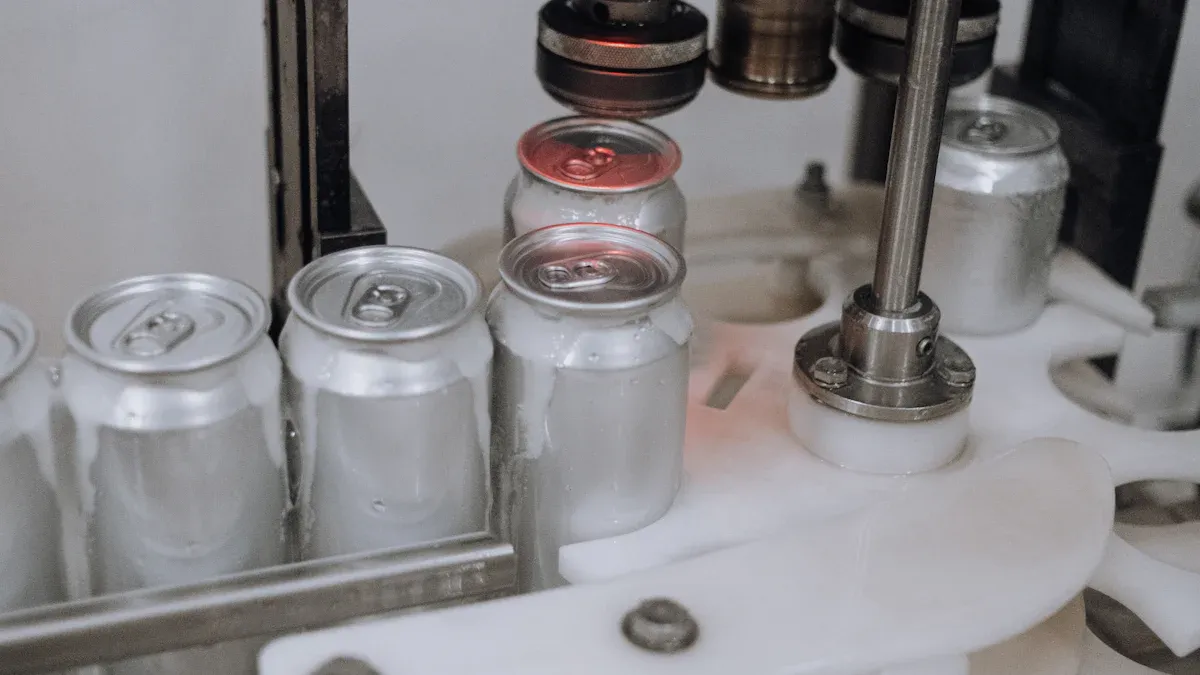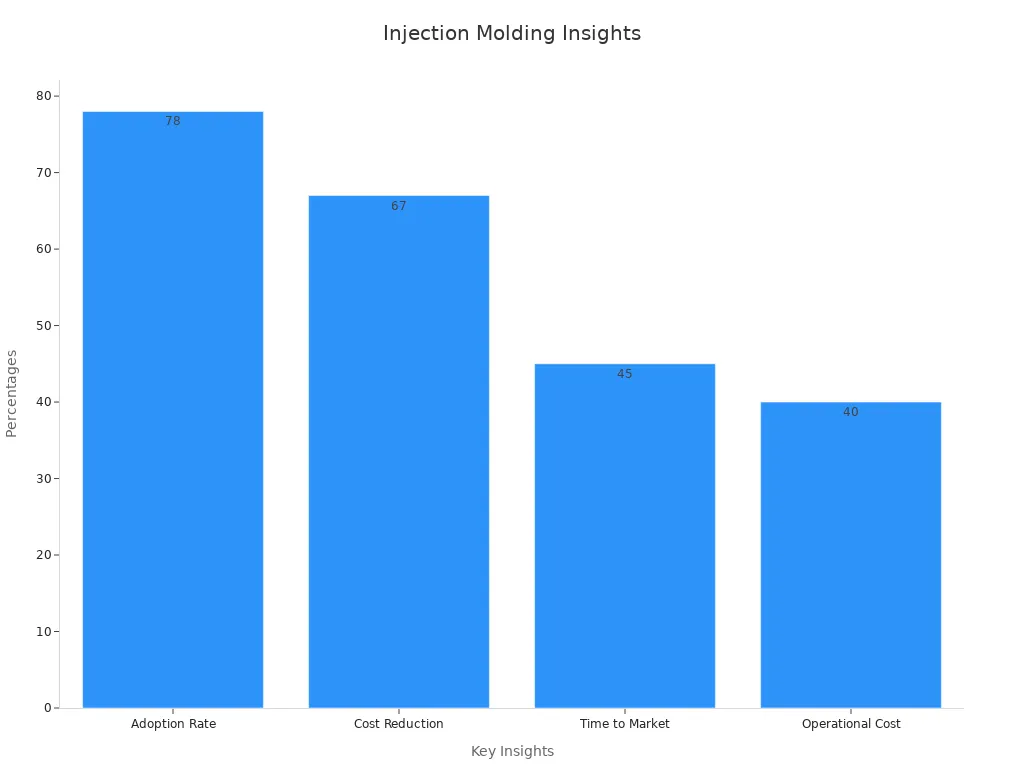
Choosing the right injection molding partner can feel overwhelming. Should you go with a full-service injection molding company or a niche firm? The answer depends on your project’s unique needs. Full-service firms offer a broad range of capabilities under one roof, while niche companies focus on specialized expertise. Understanding what your project requires helps you make the best decision. This choice impacts product quality, cost, and production efficiency, so it’s essential to evaluate your options carefully.
Full-service injection molding companies handle every stage of the manufacturing process. They offer design, prototyping, production, and post-production services under one roof. This approach ensures seamless coordination and reduces the need to work with multiple vendors. These companies often invest in advanced machinery and automation to deliver consistent results. Their ability to manage large-scale production makes them ideal for businesses with high-volume needs.
Key performance metrics highlight their operational efficiency. For example:
| KPI | Description | Ideal Value |
|---|---|---|
| Gross Profit Margin | Measures the difference between revenue and COGS. | 25% to 40% |
| Net Profit Margin | Percentage of revenue remaining after all expenses are deducted. | 10% to 20% |
| Return on Investment (ROI) | Net profit divided by investment costs. | At least 15% |
| Revenue Growth Rate | Tracks business growth over a specific period. | Above 5% annually |
| Operating Expenses Ratio | Compares operating expenses to total revenue. | Below 70% |
| Overall Equipment Effectiveness (OEE) | Measures manufacturing process efficiency. | Around 85% |
| First Pass Yield (FPY) | Percentage of products manufactured correctly the first time. | Above 95% |
These metrics demonstrate how full-service injection molding companies maintain high standards and deliver value to their clients.
Niche injection molding companies focus on specialized services. They excel in specific industries or materials, such as medical-grade plastics or eco-friendly polymers. Their expertise allows them to tackle complex projects that require precision and innovation. For instance, niche firms in China leverage their massive production capacity and low costs to handle high-volume, cost-sensitive projects. In contrast, companies in the US and Japan often prioritize quality and advanced technology.
This specialization makes niche firms a great choice for businesses with unique requirements. Whether you need a custom mold or a specific material, these companies can provide tailored solutions.
The primary difference lies in their scope of services. Full-service injection molding companies offer end-to-end solutions, making them suitable for large-scale projects. Niche firms, on the other hand, focus on specific areas, providing unmatched expertise in their chosen fields.
Another distinction is flexibility. Full-service companies handle diverse projects but may lack the depth of knowledge that niche firms bring to specialized tasks. Niche companies often deliver faster turnaround times for custom orders, while full-service firms excel in managing high-volume production efficiently.
Choosing between the two depends on your project’s needs. If you require comprehensive services, a full-service injection molding partner is the way to go. For specialized expertise, a niche firm might be the better fit.

Full-service injection molding companies provide a wide range of services that cover every stage of the manufacturing process. These firms excel in offering end-to-end solutions, making them a one-stop shop for your injection molding needs. Their services include design, prototyping, production, and post-production processes. This comprehensive approach ensures seamless coordination and reduces the need to work with multiple vendors.
For example, full-service firms offer specialized services like Class A molding, which produces high-precision parts with premium aesthetics, and tight tolerance molding for applications requiring exceptional accuracy. Below is a table showcasing some of the key services offered by these companies:
| Service Type | Description | Example Use Case |
|---|---|---|
| Class A Molding | High-precision process for parts with premium aesthetic appearance. | Automotive exterior parts |
| Tight Tolerance Molding | Produces parts with exceptionally precise dimensions. | Aerospace and medical applications |
| Class 101 Mold | Highest quality, engineered for over 1,000,000 cycles. | High production automotive parts |
| Class 102 Mold | Medium to high production tooling for close tolerance parts. | Precision medical devices |
| Insert Molding Service | Combines multiple materials for strong prototypes and production parts. | Functional prototypes |
| Overmolding Service | Ideal for pilot runs and low-volume production. | Consumer electronics |
| Medical Injection Molding Service | ISO 13485 certified for medical device manufacturing. | Medical device components |
| High-Volume Injection Molding | Focused on producing large quantities efficiently. | Mass production of consumer goods |
| Gas Assist Injection Molding | Custom prototypes and production parts with gas assist technology. | Lightweight automotive components |
| Liquid Silicone Rubber Molding | Produces silicone prototypes and parts quickly. | Medical and consumer products |
| Large Part Injection Molding | Capable of handling large-scale production needs. | Large industrial components |
In addition to these services, full-service firms often utilize advanced technologies like automated lights-out manufacturing and real-time materials management. These capabilities enhance efficiency and ensure consistent quality in the manufacturing process.
Niche injection molding companies focus on specific industries or materials, offering unmatched expertise in their chosen areas. Their specialization allows them to handle complex projects that require precision and innovation. For instance, micro-molding has become a significant area within the injection molding industry. This process demands substantial investment in equipment and expertise to produce tiny, intricate parts with high accuracy.
Companies like Kaysun Corporation exemplify the strengths of niche firms. They specialize in complex plastic injection molding applications and use advanced techniques like design for manufacturability (DFM) and scientific molding. These methods optimize the manufacturing process and ensure high-quality results. Niche firms are particularly valuable in demanding sectors such as medical, automotive, and military, where precision and reliability are critical.
By partnering with a niche firm, you gain access to specialized knowledge and tailored solutions that align with your unique project requirements.
Injection molding services offer a high degree of flexibility and customization, making them suitable for a wide range of applications. Whether you need mass production or custom plastic parts, the process can adapt to your specific needs. This flexibility is one of the reasons injection molding is considered the most efficient and cost-effective method for producing high-quality plastic parts.
The table below highlights some key aspects of flexibility and customization in plastic contract manufacturing:
| Aspect | Evidence |
|---|---|
| Mass Production Efficiency | Plastic injection molding is highlighted as the most efficient and cost-effective process for mass-producing high-quality packaging components. |
| Precision and Customization | The technology allows for the production of durable, lightweight, and aesthetically appealing products, showcasing its customization capabilities. |
| Material Versatility | The process is applicable to a wide range of products, from beverage bottles to medical containers, demonstrating material versatility. |
| Sustainability | Injection molding minimizes waste, using only about 20g of raw material to produce a component from an initial 100g, making it eco-friendly. |
Injection molding also stands out for its speed. Each cycle can produce multiple parts quickly, making it ideal for high-volume production. Additionally, the process reduces material waste, offering an eco-friendly alternative to traditional manufacturing methods like CNC machining. This combination of efficiency, precision, and sustainability makes injection molding a versatile solution for producing plastic parts.
Full-service injection molding firms require significant upfront investment. These costs include equipment, molds, materials, and labor. For instance, injection molding machines can cost between $50,000 and $200,000, depending on their type and application. Mold production adds another layer of expense, with methods like CNC machining and EDM driving up costs. Material costs, such as plastic resin pellets, range from $1 to $5 per kilogram, depending on the type of plastic used. Labor costs also vary based on the level of automation and production volume.
While these initial costs may seem high, full-service firms often justify them through economies of scale. Larger production volumes reduce the cost per part, making high-volume product manufacturing more cost-effective. This approach benefits businesses looking for consistent quality and efficiency in plastic contract manufacturing.
Niche injection molding companies offer a different financial advantage. Their lower initial investment requirements make them an attractive option for businesses with limited budgets. These firms excel in operational efficiency, often reducing inventory costs by 40-55% and shortening lead times. Advanced quality control systems also minimize warranty expenses, allowing niche firms to maintain premium pricing.
Another benefit is risk management. Niche firms enable you to test products with minimal financial commitment, reducing the risk of market failure. This flexibility makes them ideal for businesses entering new markets or launching innovative products. Over time, their specialized focus can lead to significant cost savings in plastic contract manufacturing.
Understanding hidden costs is crucial when evaluating injection molding services. Factors like mold design complexity, material type, and production volume can significantly impact your budget. For example, intricate mold designs increase initial costs due to their complexity. High-grade materials, while offering better performance, also raise expenses. Smaller production runs often result in higher costs per piece, while larger runs benefit from economies of scale.
Improving production efficiency can help you manage these hidden costs. Simplifying designs, optimizing materials, and adopting lean manufacturing practices are effective strategies. Shorter cycle times also reduce machine and labor expenses, further lowering overall costs. By addressing these factors, you can make informed decisions and maximize the value of your investment in plastic contract manufacturing.
Full-service injection molding companies follow strict quality control standards to ensure consistent results. These firms often implement globally recognized systems like ISO 9001:2015, which focuses on process-oriented quality management. For industries like automotive and medical, additional standards such as IATF 16949:2016 and ISO 13485:2016 come into play. These certifications ensure that molded parts meet the highest performance and safety requirements.
| Standard | Description |
|---|---|
| ISO 9001:2015 | A quality management system standard applicable across various industries. |
| IATF 16949:2016 | A global standard for quality management in the automotive sector. |
| ISO 13485:2016 | A standard for quality management systems in medical device manufacturing. |
Full-service firms also conduct inspections at every stage of production. Techniques like First Article Inspection (FAI) and IQ, OQ, PQ process validation ensure that equipment and processes consistently deliver high-quality plastic parts. These measures reduce variability and improve overall product assurance.
Niche injection molding companies excel in delivering tailored quality assurance for specialized projects. They often focus on specific industries, such as medical or aerospace, where precision and reliability are critical. These firms adhere to standards like ISO 9000 and ISO 14000, ensuring both quality and environmental compliance. Benchmarking against industry standards helps them identify areas for improvement and maintain high-quality outputs.
For example, niche firms in medical injection molding prioritize ISO 13485 compliance. This certification ensures that products meet stringent medical-grade requirements. Effective management practices also play a key role. By aligning their processes with customer expectations, niche firms deliver customized solutions that meet unique project demands.
| Evidence | Description |
|---|---|
| Adherence to Standards | Ensures compliance with industry-specific quality and environmental norms. |
| Effective Management | Focuses on customer needs and market-specific quality assurance. |
| Benchmarking | Identifies improvement areas by comparing with industry standards. |
Certifications and compliance validate the quality assurance practices of injection molding companies. ISO 9001 remains the most widely recognized standard, focusing on process-oriented quality control. For medical applications, ISO 13485 builds on ISO 9001 with additional requirements tailored to the healthcare industry. ITAR compliance is essential for military projects, ensuring adherence to strict regulations for sensitive technologies.
These certifications not only enhance product quality but also build trust with clients. They demonstrate a commitment to maintaining high standards and meeting regulatory requirements. By partnering with certified firms, you can ensure that your products meet industry benchmarks for quality and reliability.
Tip: Always verify a company’s certifications before starting a project. This step ensures that their quality assurance practices align with your needs.

Injection molding offers unmatched scalability, making it suitable for both small and large production runs. For small runs, short-run injection molding provides a cost-effective solution. It uses less expensive tooling and allows you to test product designs without committing to large quantities. This approach is ideal for startups or businesses entering niche markets. For example:
On the other hand, large production runs benefit from economies of scale. Once the mold is established, the process can rapidly produce thousands or even millions of identical parts. High repeatability ensures consistent quality, while design flexibility allows for customization. However, the initial tooling costs for large runs can be significant.
| Key Insights | Details |
|---|---|
| Adoption Rate | 78% of manufacturers use small batch production. |
| Cost Reduction | 67% reduction in inventory costs. |
| Time to Market | 45% faster time to market. |
| Operational Cost | Average 40% reduction in costs. |

Injection molding companies continuously adapt to meet changing market demands. For instance, Daoben Machinery upgraded its equipment to double production output while maintaining quality. This adaptation allowed them to handle rising production demands and expand their market share.
The industry is also shifting toward sustainability. The bioplastics market, projected to grow at a CAGR of 16.2%, reflects the demand for eco-friendly products. Manufacturers now focus on biodegradable and bio-based plastics to align with consumer preferences. Additionally, advancements in technology enable the production of customized designs, helping businesses stay competitive in modern markets.
Lead times in injection molding depend on factors like mold complexity and production volume. A small project with 500 samples may take around four weeks, while a large-scale project with intricate designs could take two to six months. Special features, such as unique feeding systems, can further extend lead times.
On-time delivery (OTD) is critical for maintaining a reliable supply chain. A high OTD ensures that your orders arrive as scheduled, preventing production downtimes and customer dissatisfaction. Suppliers with strong OTD performance help you meet deadlines and maintain a stable production flow.
Tip: Always discuss lead times and delivery schedules with your injection molding partner to avoid unexpected delays.
Choosing the right injection molding partner starts with understanding your project requirements. You need to evaluate factors like production volume, material specifications, and quality standards. For instance, if your project involves medical-grade components, you must prioritize ISO 13485 certification and cleanroom manufacturing capabilities. Similarly, high-volume production demands a partner with advanced machinery and proven scalability.
A pharmaceutical company’s experience highlights the importance of detailed project evaluation. They needed a partner to enter the biopharmaceutical market, focusing on technical requirements for molded parts. Their criteria included ISO Class & Clean Room manufacturing, ISO 13485 certification, and U.S.-made tooling. Despite budget constraints, the selected partner addressed design challenges with innovative tooling solutions, ensuring project success.
To simplify your evaluation process, consider these key metrics:
| Evaluation Metric | Description |
|---|---|
| ISO certification | Ensures compliance with international standards. |
| On-time delivery metrics | Measures reliability in meeting delivery schedules. |
| Manufacturing capacity | Indicates the ability to meet production demands. |
| Quality metrics (PPM) | Assesses the quality of products produced. |
| Internal rate of production scrap | Evaluates efficiency and waste in production. |
These metrics help you identify a partner who aligns with your project’s unique needs.
Matching a firm’s capabilities to your project requirements ensures a successful partnership. Start by assessing their experience in your industry. A competent injection molding firm should demonstrate relevant expertise and provide client referrals. Discuss their manufacturing capacity and delivery processes to confirm they can meet your production demands.
The Capability Index emphasizes the importance of a firm’s ability to meet specifications. The Process Capability Index (Cpk) measures how closely molded parts meet required specifications, reflecting the firm’s ability to fulfill your project needs effectively.
Open communication is another critical factor. Your partner should maintain transparency and respond promptly to your concerns. This approach fosters collaboration and ensures your expectations are met throughout the project.
Here are some practical steps to evaluate a firm’s capabilities:
- Check their portfolio for similar projects.
- Verify their certifications and compliance with industry standards.
- Assess their ability to scale production based on your needs.
By aligning their capabilities with your requirements, you can ensure a smooth and efficient manufacturing process.
Balancing cost, quality, and scalability is essential when selecting an injection molding partner. While price and lead time are important, you should prioritize quality and service. Conduct a thorough cost analysis, including potential extra costs like mold maintenance or material upgrades. Assess project complexity and its impact on cost and timelines.
Material selection plays a significant role in balancing these factors. The type of resin affects both cost and performance. Design optimization can also reduce material usage and simplify the molding process, lowering costs. Investing in high-quality molds enhances efficiency and minimizes defects, supporting a balance between cost and quality.
Consider these steps to achieve the right balance:
1. Collaborate with design engineers to optimize part geometry and reduce costs.
2. Choose materials that balance performance and cost-effectiveness.
3. Invest in well-designed molds to improve production efficiency.
4. Continuously monitor and optimize the injection molding process to minimize waste.
For example, a provider who offers scalable solutions can adapt to your changing production needs. This flexibility ensures you meet customer demands without compromising quality or exceeding your budget. By focusing on these aspects, you can maximize the benefits of your injection molding partnership.
Choosing between full-service and niche injection molding firms depends on your project’s unique requirements. Full-service firms provide comprehensive solutions, while niche companies excel in specialized expertise. Aligning your choice with your needs ensures better outcomes.
Consider key factors like material selection, mold design, and functional testing. The table below highlights these critical aspects:
| Factor | Description |
|---|---|
| Material Selection | Choosing the right plastic material based on properties like strength, flexibility, and heat resistance. |
| Design for Manufacturing (DFM) | Optimizing the design for efficient mold manufacturing and assembly. |
| Mold Design | Considering mold complexity, cooling efficiency, and ejection mechanisms. |
| Injection Molding Process | Determining required machine tonnage, cycle time, and process parameters. |
| Assembly | Designing parts for easy assembly to minimize labor and time. |
| Functional Testing | Defining tests to verify performance and durability of the part. |
| Transportation and Packaging | Ensuring parts withstand transportation and storage conditions. |
| Customer Usage | Considering how the part will be used and the stresses it may encounter. |
Evaluate your priorities, research potential partners, and ask targeted questions to make an informed decision.
Full-service firms handle all aspects of production, from design to post-production. This ensures seamless coordination and reduces the need for multiple vendors. Their quality management systems also guarantee consistent results, making them ideal for large-scale projects.
Niche firms specialize in specific industries or materials. They use advanced quality management systems tailored to their expertise. This focus allows them to deliver precise and reliable solutions for complex projects, such as medical or aerospace components.
Yes, many firms offer comprehensive secondary operations services. These include assembly, packaging, and finishing processes. These services streamline production and ensure your parts are ready for immediate use or distribution.
Evaluate your project’s needs. If you require end-to-end solutions, choose a full-service firm. For specialized expertise, a niche company may be better. Consider factors like production volume, material requirements, and quality standards.
Yes, injection molding minimizes waste by using only the necessary material for each part. Many companies now offer sustainable options, such as biodegradable plastics, to meet growing environmental demands.